






By LAURA NWOGU
After 40 days of a “Target Fast” led by Pastor Jamal Bryant and supported by 200,000 petitioners and Black churches across the U.S., the New Birth Missionary Church pastor announced at Easter Sunday service that the fast would shift into a “full-on boycott.” It’s just one way that the big retailer has been hit since it rolled back its diversity, equity, and inclusion commitments on January 24.
For 10 consecutive weeks, foot traffic at Target has decreased, and its stock has dropped. According to data from Placer.ai, Target saw a 7.9% decline year-over-year. As of Thursday, Target stock has dropped from $138 in January to $93.11. For many, the decline increasingly shows the force and power of the Black dollar.
“One church had an idea, and it became a spark that became a flame,” Bryant said.
With the fast, Bryant said they had four demands of Target:
1. Honor the $2 billion pledge to the Black business community through products, services, and black media buys
2. Deposit $250 million in any of our 23 Black banks
3. Completely restoring the franchise’s commitment to DEI
4. Pipeline community centers at 10 HBCUs to teach retail business at every level

Bryant said the deadline to meet those demands and end the boycott was 9 a.m. on Sunday. Target only committed to one of the demands and did not meet that deadline.
“40 days was not the deadline. It was the benchmark for us to see where it is that we
are, and to be able to recalibrate. History will record that this is the most effective boycott for our community, nationally, since Montgomery. And strikingly different, Montgomery was just a city, and this is impacting the entire nation. So, we’re glad to have such a
grasp and have such a bridge.”
On Friday, New Birth unveiled its Bullseye Black Market, a curated marketplace at the Samson Health & Fitness Center, featuring 104 entrepreneurs and their businesses. From art and makeup to sweet treats, clothing, and skincare, the market is a hub that allows people to invest their money back into the Black community.
“Black people have no shortage of creativity, we have no shortage of ingenuity, we have no shortage of talent,” Bryant said before he cut the ribbon welcoming DeKalb County residents and leaders into the space.
Clark Atlanta University graduate Kim Roxy is the founder of LAMIK Beauty, the first Black-owned clean makeup brand to be carried by Ulta.com. Based in Tulsa, Oklahoma’s Greenwood District, Roxy said she traveled to Stonecrest to participate in the Bullseye Black Market.
“I opened up a store in Black Wall Street because I believe in us having equity and ownership in the beauty industry,” Roxy said. “We need this unity. We need to make them respect us. It is very important that we take back our power.”
When Target scaled back its DEI efforts, Black business owners who sell at Target warned that the boycott could also hurt their businesses. Chantelle Powell owns
By DyANA BAGBy
State Sen. Jason Esteves announced Monday he is running to be Georgia’s next governor.
The 41-year-old attorney and small business owner said he would “cut through the chaos” created by President Donald Trump to focus on expanding healthcare, improving education, and investing in small businesses.
“I’ve had enough of families working harder than ever, but still struggling, and our kids falling behind instead of getting ahead. Yet extreme politicians in Georgia push Trump’s reckless agenda, rigged the system for special interests, and stick us with the bill,” Esteves said in a YouTube video announcing his candidacy.
In an interview, Esteves, whose district includes parts of Atlanta, Cobb, and Fulton counties, said Georgia needs a governor who can help focus the legislature on “issues that matter.”
“It’s a shame that with 70% of our kids not reading on grade level, our legislature did not spend more time on that instead of spending time on political issues that were on our table just because Donald Trump said so,” he said.
There are more than 500,000 Georgians who don’t have health care, but the legislature didn’t address Medicaid expansion this year, Esteves said. Republican Gov. Brian Kemp and state lawmakers spent more time handing out large tax incentives to big businesses rather than assisting small businesses, he said.
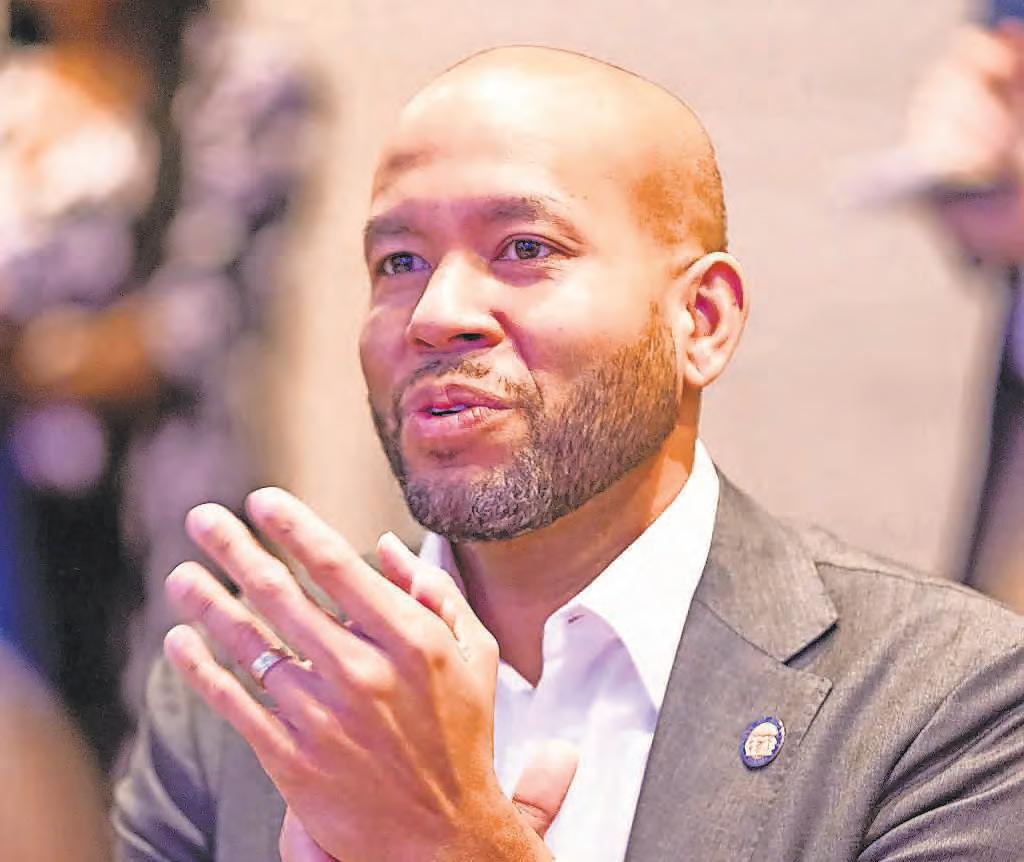
“Georgia needs a governor that is going to put those issues at the forefront,” Esteves said. “Georgians want a governor that can cut through the chaos, can block out the noise, and focus on what really matters.”
If elected, Esteves would be the first Black and first Latino governor in the state’s history.
“I think that it’s important that we break that ceiling of having a first Black governor and a first Latino governor,” he said. “And I will certainly look forward to breaking that ceiling.
“[The] focus is going to be making sure that the problems that have been
challenging our community for years — access to healthcare, high quality, and affordable housing, making sure that our schools are invested and good across the state, and making sure that our entrepreneurs and then our small business owners can create and grow small businesses.
“I want to make sure that we’re tackling the issues that our communities care about the most. And with me, they’re going to be getting someone that that not only tackles those issues but makes sure that while I’m I may be the first, that I’m not the last Black governor or the last Latino governor and that there are many more that follow behind me.”
The state’s top job will be open next year because Republican Gov. Brian Kemp’s is limited to two terms.
Esteves is the first Democrat to officially enter the gubernatorial race. Former Atlanta mayor Keisha Lance Bottoms said earlier this month she was considering a bid for governor. Other Democrats that could be running include former DeKalb County CEO Michael Thurmond and Stacey Abrams, who lost twice to Kemp for the seat. U.S. Rep. Lucy McBath suspended her campaign because of her husband’s illness.
For the Republicans, Attorney General Chris Carr has already announced he was running to succeed Kemp. Lt. Gov. Burt Jones is also expected to announce his candidacy soon.
Esteves served as chair of the Atlanta Board of Education before he was elected to the state senate in 2022.
By ITORO N. UMONTUEN
Monday, Georgia Governor Brian Kemp signed the tort reform legislation during a ceremony at the State Capitol. The issues dominated the majority of this year’s General Assembly’s legislative session. Kemp believed it would be harder for persons to file frivolous lawsuits while limiting huge payouts. The governor intensely pushed tort reform during his State of the State Address in January. He promised to call a special session if Georgia’s General Assembly did not successfully get this passed. While Kemp staked his political future on tort reform, he didn’t want to hear any of it.
“Today is a victory for the people of our state who for too long were suffering the impacts of an out-of-balance legal environment,” said Governor Brian Kemp. “I am grateful for the diligent work of Commissioner John King and his office in studying this issue. As a result of this collective effort and outpouring of support from Georgians of all backgrounds, Georgia continues to move in the right direction as we work to stabilize costs and compete for economic opportunities that will create good paying jobs for hardworking Georgians
across our state.”
The legislation will overhaul the process of civil lawsuits in Georgia. For example, there will be limits on the monetary amounts of damages that can be awarded to plaintiffs. The final version made concessions for sex trafficking victims. But, the legislation does not include survivors of child abuse, elder abuse, sexual abuse. It also does not account for violent crimes when plaintiffs seek to sue places like abusive daycares or retirement homes.
Kemp says tort reform is better for consumers (and business)
Supporters of tort reform say stopping frivolous lawsuits and payouts would lead to lower insurance rates for businesses and consumers. Their argument is if Georgia is the number one state to conduct business, it cannot be a ‘judicial hellhole’. However, Kemp once again told everyone the legislation will protect people’s right to bring claims and “be made whole.”
According to the Governor’s Office, the bill does not place a cap on the amount of money a jury may award. Additionally, the Governor’s legislation protects the jury’s decision making from irrelevant and improper arguments from counsel. Also, they claim it empowers the jury
to decide an award amount based on real evidence in the case.
“Getting lawsuit reform across the finish line took all of us coming together to deliver this win for Georgia,” said Senate Pro Tempore John Kennedy. “Georgians deserve a balanced civil justice system, not one that incentivizes frivolous lawsuits, leading to higher insurance premiums that burden small businesses, job creators, healthcare providers, and families. I am grateful to Governor Kemp for his trust in me as the Bill Sponsor and his unwavering leadership to get these meaningful pieces of legislation across the finish line.
Democrats fought tooth-and-nail to keep this bill from becoming law
What concerns the Democratic Caucus about the tort discussion is the notion that insurance rates are going to go down. That is a lofty promise knowing that in Georgia and surrounding states, once-in-a-generation weather events are becoming more common. Moreover, according to a Tampa Bay Times investigation, insurance companies claimed they were losing money after hurricanes. But, executives operating companies in Florida distributed $680 million in dividends to
shareholders while diverting billions more to affiliate companies. Many Democrats seized on this idea during the debate.
“I am disappointed but not surprised that Governor Kemp signed Georgia Republicans’ scam to strip away the fundamental rights of victims who have been harmed through no fault of their own,” said State Rep. Stacey Evans in a statement.
In May 2023, Governor Kemp signed a bill giving Georgia Insurance Commissioner John King the ability to review all car insurance rate filings before they go into effect. Subsequently, the average annual cost of full auto coverage increased 20% in Georgia. Currently higher than the nationwide percentage of 15%, according to Insurify.
“During the session, we heard hours of heartbreaking testimony from victims who begged the legislature to reject this dangerous legislation, but Georgia Republicans did not care,” Evans said. “Instead, they cruelly dismissed these victims and were all too happy to provide a free pass for large corporations to escape accountability for their negligence. Our laws should stand up for injured Georgians, not give big corporations a free pass for turning a blind eye.”
By RASHONDA TATE
When I began researching the downside of AI, I decided to run a few chapters from my book Miss Pearly’s Girls through one of those popular AI detectors—you know, the kind that schools, editors and employers are using to “verify” whether work is human or machine-made. The result?
This work is 92 percent AI-generated. That’s what it told me.
There was just one problem. I wrote Miss Pearly’s Girls in 2020. From scratch. By hand. Long before ChatGPT even existed.
What began as a curiosity quickly turned into a gut punch. How could my own words—written from my spirit, my experience and my culture— be misclassified as artificial? I soon found out the answer is more complicated—and far more disturbing—than a faulty detector. My words were stolen
After digging deeper, I discovered that my book had been scraped—yes, stolen—and used to help train artificial intelligence models without my knowledge or permission. It turns out that not just that book but 49 other books were used. And I’m not alone. Apparently, Meta used the work of thousands of authors to train its AI. That’s right. It was fed into the AI machine, repackaged and returned to the world without our names attached.
Much of this happened through digital piracy. If you haven’t heard of LibGen (Library Genesis) or Anna’s Archive, let me introduce you to the internet’s biggest warehouse of stolen books. These platforms are essentially black-market libraries stocked with pirated copies of thousands—maybe millions—of books, academic texts and creative works that authors and publishers never gave consent to distribute. Most of us writers knew about it. We sighed. We tolerated. We grit our teeth and kept creating. But now there’s something new—and far more worrisome.
Recently filed court documents in the Northern District of California allege that Meta, the tech giant behind Facebook and Instagram, deliberately targeted LibGen and Anna’s Archive to extract content and train its latest AI model, LLaMA 3. That’s right. The allegation is that Meta authorized a data raid on a known pirate site. And that raid may have included your work. It definitely included mine.
Legal action is now underway. A class-action lawsuit—Kadrey v. Meta—has been filed, accusing the company of copyright infringement on a massive scale. If your book was part of that training set, you are automatically included in the


lawsuit. You don’t need to do anything just yet. The court is first deciding whether Meta broke copyright law. A ruling is expected this summer.
And this isn’t just about Meta.
OpenAI, Microsoft, Anthropic and others are facing similar lawsuits. In the case against OpenAI (another company I discovered was using my books to train AI), the Authors Guild, along with major names like John Grisham, George R.R.
Martin and Jodi Picoult, is fighting for all U.S. authors whose work has been ingested into GPT’s training data—whether you’re famous or not.
The impact hits harder for Black writers
Let’s be honest. Black authors already face enough challenges: fewer publishing opportunities, smaller advances and limited marketing support. Now, to add insult to injury, our voices are being absorbed into tools that may ultimately replace or erase us.
And to make matters worse, we’re being accused of using AI when we haven’t.
I’m hearing more and more stories from Black writers being flagged—falsely—by AI detectors. These tools claim to detect “robotic” patterns, but often what they’re really detecting are the nuanced, unique ways we speak, write, and structure language.
It’s not just technical bias—it’s cultural erasure.
What you can do right now
If you’re a writer, creative, or educator, here are some things you should know and do:
• Check if your book is listed on LibGen or Anna’s Archive. Many are, even if you never authorized it.
• Read up on the class-action lawsuits. You don’t have to be a named plaintiff to benefit if the cases succeed.
• Be cautious with AI detection tools. They are notoriously unreliable and biased.
• Use trusted tools like the Authors Guild AI Resource Page to protect your work.
• Speak up. The more we raise our voices, the harder it is for tech companies to ignore the real harm they’re causing.
FOUNDED May 11, 1966
FOUNDER/EDITOR
Ed Clayton Immortalis Memoria
PUBLISHER/EDITOR
J. Lowell Ware Immortalis Memoria The Atlanta Voice honors the life of J. Lowell Ware.
PUBLISHER
Janis Ware
PRESIDENT/
GENERAL MANAGER
James A. Washington 2018-2024
EXECUTIVE ASSISTANT TO PUBLISHER
Chia Suggs csuggs@theatlantavoice.com
EDITOR IN CHIEF Donnell Suggs editor@theatlantavoice.com
GENERAL ASSIGNMENT REPORTERS Isaiah Singleton isingleton@theatlantavoice.com
Laura Nwogu lnwogu@theatlantavoice.com
EDITOR AT LARGE Stan Washington swashington@theatlantavoice.com
MANAGING EDITOR, DIGITAL Itoro Umontuen iumontuen@theatlantavoice.com
ADVERTISING, SALES & CIRCULATION
ADVERTISING ADMINISTRATOR
Chia Suggs advertising@theatlantavoice.com
CIRCULATION MANAGER
Terry Milliner
SALES
R.D.W. Jackson rdwadman@gmail.com
SUBMISSIONS editor@theatlantavoice.com
DIRECTOR OF PUBLIC RELATIONS
Martel Sharpe msharpe@theatlantavoice.com
CONTACT INFORMATION
633 Pryor Street, S.W. Atlanta, GA 30312 Office: 404-524-6426 info@theatlantavoice.com

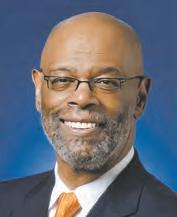
BY JAMES A. WASHINGTON
My word for today is steward or stewardship. I haven’t found this very important word in the bible yet, but I have heard many a pastor preach on it. From the pulpit, I’ve heard the question asked, “Are we good stewards of our own sexuality?” I have personally received the message of stewardship as it relates to tithing. However, I must admit that it wasn’t until I heard someone ask the Lord (in prayer) to be a good steward of His Word that the term really hit home. On many occasions, I have prayed to be a worthy vessel for the Holy Spirit. Face down in prayer, I’ve asked my Lord and Savior to empty me of all those human characteristics that prohibit the Holy Spirit from residing in me. My thought was, and continues to be, that any (and I do mean any) space in my soul or my heart that could be good enough for a dwelling place for Him would somehow indicate my effort to live a good
Christian life. It is my way of asking God for help. I am often reminded that I’ll never be worthy of such a request, but it’s very hard to accept. But as you can see, I’m working on it. My point is that stewardship or being a good steward is an action. It calls for an effort. When I heard the prayer calling on the Lord to be a good steward of His Word, I immediately thought about what that would mean for me. I came to the conclusion that if one were a good steward of God’s Word, then that Word should be nurtured and cultivated for one purpose and one purpose only: to bear fruit. I’m declaring that you cannot be a good steward of God’s Word and not bear some fruit. In this case, that fruit should be given so that others recognize that you
“YOUR VOICE”
are a vendor for that fruit. Somebody should see your fruit stand. Through your behavior, attitude, verbal praise, prayers, or some other outward manifestation, the world should see God’s Word operating in you.
Some say people should see Christ in you. When you are viewed by others, there should be no question about who you are and whose you are. I’m just now more convinced than ever that stewardship is a verb. The Word cannot reside in you quietly. It cannot be a secret only between you and God. Nor can it be selectively used when it suits you. The Word is what it is. Like water, it cannot be held back; nor should it be.
Once again, I submit to you that if you are a child of God, people need to hear you say that you know who your
Daddy is with pride and boldness. I believe that is what is meant by the saying ‘being a good steward.’ It demands personal recognition that we acknowledge and share the truth that is in us. It requires action; the kind that makes those around us know, without a shadow of a doubt, that we accept Christ as our Savior and God Almighty as the one true God. If those around you know that, then you are a good steward in bearing fruit. If no one around you knows this, you may need to go shopping.
May God bless and keep you always.
This column is from James Washington’s Spiritually Speaking: Reflections for and from a New Christian. You can purchase this enlightening book on Amazon and start your journey toward spiritual enlightenment.

In this day of media content excess, who do you listen to when you want to figure out what’s true?

JAMAL LEE
Atlanta
“I would say the Breakfast Club is how I vet if a story is worth listening to outside of social media. Tezlyn Figaro is their news correspondent. And then for my music news, I listen to the Company Man, Justin Hunte on YouTube.”
Compiled by Vincent Christie

TRANESIA JOHNSON
Atlanta
“For news, I just view whatever pops up on my Instagram timeline or messages my friends send me with links to pages. I wouldn’t say that [Instagram] is trusted, I view it there, and it’s probably most convenient because that’s the one I look at most.”


“I listen to a lot of different podcasts. Democracy Now, the Atkins News Network on YouTube with Dr. Gerald Horne. I listen to Black Information Network on 640 am. That’s about it for the most part, and those are my main, non-mainstream media news outlets. I listen to different podcasts [for various points of view.] Sometimes I might listen to Jimmy Dore. I might have listened to Chris Hedges. He has a YouTube show. I listen to Katie Halper, and Aaron Maté. Uh, so those are a few of the people that I follow. Oh, Black Liberation Media as well. They have a YouTube channel too.”
“If it comes from anywhere other than the Daily Show, I don’t listen. People who can make you laugh might be a little trustworthy. They seem completely well-informed, and their opinions are objective without being harmful because you can have your opinion and not squash anybody else’s. You exist in your own world, and they kind of exist in their own world while navigating the world around them. So, I’m cool with that.”

Atlanta
“I listen to the Daily Show, and Late Night with Seth Meyers. Every now and then, I check out CNN, but also podcasts, online, on YouTube, and everything like that. I get some of my information from social media, but then I continue studying to find more information. So, once I hear a snippet, I also go to Google to find out. Whether what they’re saying is factual or not. [When it comes to social media, I follow] Instagram, primarily TikTok, every now and again. I don’t mess with X; there’s too much noise happening around it. But I also check out just msn.com or yahoo.com for articles and everything.”

By NOAH WASHINGTON
Walking into Portrait Coffee shop in the West End, RaShaun Kemp, 45, was as cool as he could be in his pullover sweater and tinted sunglasses. Originally from Columbus, Ohio, Kemp blends in effortlessly with the West End crowd- Kemp was amongst his people. Sworn into the Georgia State Senate in January 2024, Kemp recently completed his first session in the Georgia State Senate, representing District 38.
A City of South Fulton resident, Kemp moved to Georgia in 2011, drawn by the sight of Black people “running the city, running the government.” Now, as a freshman lawmaker, he’s fighting what he sees as a series of attacks on minority rights.
Kemp, who identifies as Black and Mexican-American, spoke candidly about his transition from educator to politician, the political landscape following Donald Trump’s 2024 presidential victory, and his concerns about corporate America’s muted response to social issues.
“I enjoy the fight,” Kemp said about serving in the minority party at the Georgia Legislature. “I enjoy being down at the Capitol with people diametrically opposed to everything I believe in. We all have a role to play in the fight. For me, it’s about showing up and being a voice for my people and my community, ensuring our values, struggles, and perspectives are heard and reckoned with. Even in spaces where we’re outnumbered, our presence matters.”
Kemp’s background includes a career in education and public service. Kemp began as a high school principal at just 27 years old at Focus Learning Academy in Columbus, Ohio. Currently serving as Senior Director at the National Charter Collaborative, an organization focused on amplifying the voices of Black and Brown public charter school leaders. His work in education policy predates his time in office, including helping pass a 2012 amendment known as “Amendment 1” that created the State Charter Schools Commission of Georgia.
Kemp’s legislative interests reflect his professional experience. He serves on several Senate committees, including Agriculture and Consumer Affairs, Education and Youth, Government Oversight, State Institutions and Property, and Urban Affairs.
In his first year, Kemp saw early success with the passage of Senate Bill 93—his first bill to be signed into law. The legislation, one of the few Democratic-sponsored bills to reach the Governor’s desk (not yet signed), aims to improve student literacy by requiring evidence-based reading instruction.
Beyond politics, Kemp is deeply rooted in community service. He has chaired Atlanta’s Neighborhood Planning Unit K and served on boards such as Georgia Equality, Ivy Preparatory Academy for Girls, and the Lillie’s Foundation. His volunteer work includes food distributions and community cleanups throughout Metro Atlanta.
Kemp expressed alarm at what he views as a targeted legislative assault on minority rights, pointing to several bills that have advanced in
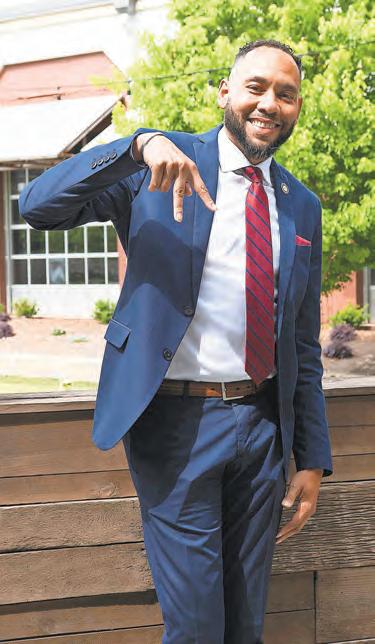
into law,” Kemp said, referencing legislation affecting transgender individuals. “The next thing they tried was the ban on diversity, equity, and inclusion.”
Kemp believes these efforts are part of a broader strategy responding to Georgia’s changing demographics.
“They continue to find ways to chip at the progress that we’ve made,” he said. “They are trying to indoctrinate people, not to see them as bad.”
Kemp also strongly opposed proposals to eliminate the federal Department of Education, warning that such moves would harm marginalized communities.
“If you get rid of Title 1 programs, or you get rid of federal student loan programs and put that up to the states, you have this hodgepodge of policy implementation that I think would be very detrimental to people who look like us,” he said.
Additionally, he criticized corporations for failing to push back against controversial legislation, arguing that many are “capitulating” to right-wing pressure.
“My fear is corporations are just capitulating to this, and it’s going to take away opportunities for us,” Kemp said. “I think they have a responsibility” to ensure equal opportunities at all levels.
Georgia’s Republican-controlled legislature.
“We had a raindrop in Senate Bill 1, and then more rain came with the religious freedom bill that the governor already signed
Despite the uphill battle, Kemp remains hopeful and driven. “It takes all of us to effect change,” he said. “My goal is just to get people to see that a regular person can serve in elected office, and you can make some positive change.”
Continued from page 2
Play Pits, a non-toxic natural deodorant geared toward kids and sold on Amazon and at Walmart and Target. While she expressed disappointment at Target’s decision, she was confident it wouldn’t change the “trajectory of what God has for me.”
“As a Black business owner, obstacles are just part of the process. Two years ago, I lost my warehouse to a fire. I lost everything in it. And so coming out of that, nothing really scares me,” Powell said. “I’m a Black woman before I was a founder. Just like everybody, it was disappointing to hear that a retailer who stated that they were for us seemed to be rolling back on that.”
Powell shared that she never considered pulling her products from Target, noting that leaving would hurt her business even more. She intends to focus on her customers, give back to the community, and keep pushing forward by providing accessible products for busy parents and their kids.
“I think the work that Pastor Jamal Bryant is doing is amazing because he’s making them pay attention and really getting our people to unify and pay attention to how we have dope businesses, and we deserve spots on those shelves.”
Bryant plans to host a town hall meeting at New Birth on Tuesday, April 22, at 7 p.m. to discuss the next phase of the boycott.



By ISAIAH SINGLETON
Morehouse College will welcome Dr. Cornel West, American philosopher, scholar of African American studies, and activist, as its keynote speaker for the 141st Commencement Exercises on Sunday, May 18, 2025, at 9 a.m. on the College’s Century Campus.
West will also receive an honorary doctorate of humane letters from the institution.
West’s speech will culminate a week of undergraduate and alumni reunion events, celebrating the class of 2025, as well as milestone alumni anniversaries, including 10th President of Morehouse College, Robert Franklin ’75; Morehouse Board Chair, Willie Woods ’85; former U.S Congressman, Cedric Richmond ’95; American attorney, political commentator, and politician, Bakari Sellers ’05; as well as business executive and art enthusiast, George Wells ’00.
Additionally, honorary doctorates will be presented to two exemplary individuals whose lives reflect a legacy of scholarship, leadership, storytelling, and justice:
Ava DuVernay: An award-winning filmmaker, director, and storyteller, celebrated for Selma, 13th, When They See Us, Brown Sugar, and Origin. She is the highest-grossing Black woman director in U.S. box office history.
Dr. David A. Thomas: The retiring 12th president of Morehouse College holds the distinction of raising more funds than any other president in the College’s 158-year

By ISAIAH SINGLETON
As high school graduation season approaches—a time marked by both celebration and uncertainty—South Atlanta High School senior Jeronimo Dye, 18, is looking ahead to his next chapter: college.
Dye is among the seniors who attended a recent pop-up event sponsored by Witherite Law Group and 1-800-TruckWreck. The event supported students who applied for the “Making a Difference” Scholarship, offering them access to a free clothing popup shop to help them prepare for scholarship interviews and college visits.
The “Making a Difference” Scholarship offers financial support to students who have shown leadership in their schools and communities.
In an interview with The Atlanta Voice, Dye shared his excitement—and
apprehension—about graduating and stepping into adulthood.
“I’m ready to graduate, but it’s a little scary because I’m stepping into the real world,” Dye said. “It’s not scary like I want to back out—it’s more the uncertainty with things like financial aid, and then with Trump back in office, it’s hard to know what the future will look like.”
After graduation in May, Dye plans to attend Georgia State University, where he’ll major in professional theater and film. His long-term goal is to become an actor.
“My first year, I’ll be at Georgia State. Hopefully my refund money comes back right so I can invest it. By my second year, I want to transfer—maybe to Howard, Manhattanville, or somewhere in New York,” he said.
To rising seniors, Dye emphasizes the importance of time management
“Senior year can feel like you’ve got a lot of time, but really, you don’t,” he said.
“Start early—essays, videos, scholarships. I missed out on a lot of opportunities because I waited too long.”
He also recommends saving money in advance, noting that senior year can be surprisingly expensive. Dye expressed his gratitude to Witherite Law Group and 1-800-TruckWreck for offering real-world resources.
“I really love what they’ve done for us. We’re a Title I school, and the average income around here is like $25,000 to $28,000. A lot of students don’t have what they need for interviews—like business clothes. This helped a lot.”
In communities like his, Dye says, opportunities like this are rare—but deeply appreciated.
“I love that they’re giving us this chance. It shows they care and want us to be ready—not just for graduation, but for what comes after.”
history. Under his leadership, Morehouse has nearly completed a record-breaking $500 million ‘Making Men of Consequence’ capital campaign and experienced unprecedented growth in national and global influence.
Additionally, an honorary Bachelor’s degree will be presented posthumously to Dennis O. Hubert (1911–1930), a sophomore divinity school student at Morehouse College who was lynched by a racially charged mob on June 15, 1930, at the age of 18 on the playground of Atlanta’s segregated Crogman School.
Morehouse College will honor his life and legacy with a posthumous honorary degree. The traditional Baccalaureate Service will occur at 3 p.m. on Saturday, May 17, in the Martin Luther King Jr. International Chapel.
This year’s speaker is Rev. Brandon Thomas Crowley ’08, Ph.D., an esteemed scholar, humanitarian, and pastor of the Historic Myrtle Baptist Church in Newton, Massachusetts. It is one of the nation’s oldest open and affirming Black Baptist congregations, founded by formerly enslaved Africans during Reconstruction.
Crowley is a nationally recognized expert in religion, theology, and queer theory. He serves as a Lecturer in Ministry Studies at Harvard Divinity School, a Founding Faculty Affiliate of the Global Human Rights Program at Harvard Kennedy School, and the 2024–2027 Visiting Professor and Honorary Research Fellow at the University of Exeter in England.

Jeronimo Dye, a South Atlanta High School senior, will be attending Georgia State University to pursue his dream of becoming an actor. He received a “Making a Difference” Scholarship from Witherite Law Group, which provides financial assistance to students who have demonstrated leadership in their schools and communities.
People overcoming challenges together is a beautiful sight to see—and it’s something Dr. Henry Young and his team from the University of Georgia (UGA) have witnessed firsthand through their Fishers of Men initiative. This unique community-academic partnership between UGA and rural churches is addressing critical health needs and creating new opportunities across several Georgia counties. What they discovered along the way is profound: the community itself is the most powerful tool for improving rural health. “It was outstanding to see how everyone came together to help one another,” said Dr. Henry Young, a College of Pharmacy Professor at UGA. “The social connectedness proves that we need to meet people where they are. If we want to move the needle on community issues, the
Together, they’re tackling a range of health challenges using evidence-based strategies—beginning with a major one: Type 2 diabetes
A UGA study shows that nearly 20% of rural Georgians have developed Type 2 diabetes in the last decade, driven by limited access to healthcare, healthy food options, and lifestyle education. Determined to reverse that trend, Dr. Young and his team introduced the CDC’s Diabetes Prevention Program to the communities involved.
The year-long program includes 12 modules, led by certified lifestyle coaches trained at Emory University. The first half focuses on forming healthy habits; the second half emphasizes sustaining them. Importantly, all sessions are held in the churches—trusted, central gathering places—ensuring accessibility and comfort.“My
Alabama—so this work is personal.”
The initiative sparked a ripple effect. Attendees formed accountability groups, shared healthy recipes, and even coordinated transportation for neighbors with limited mobility. Friendly competition among churches added motivation, and above all, the community spirit blossomed.“I saw individuals sharing stories about how they encountered and overcame various challenges. They vicariously learned from each other. These stories built the resilience of the community,” said Dr. Young.
Looking ahead, Dr. Young and his team plan to expand the program to more churches in southwest Georgia. They also aim to tackle maternal and child health issues and develop telehealth services to reach even more people in need.
While the Fishers of Men initiative be


By NOAH WASHINGTON
“Somebody is going to pay the price, and we don’t accept layaway in 2025,” Dr. Jamal H. Bryant said to a crowd standing up and in applause, as he addressed the Target Fast Town Hall Meeting on Tuesday night.
The town hall was hosted on the 42nd day of an initial 40-day fast organized by New Birth Missionary Baptist Church. The retail fast has expanded into a national boycott movement against Target and broader institutions, spearheaded by the church’s pastor. The campaign, which criticizes the rollback of diversity, equity, and inclusion (DEI) initiatives by the retail giant, continues to draw widespread attention and support.
On Tuesday, April 22, the Target Fast Town Hall Meeting took place at Salem Bible Church in Lithonia. From the stage, Bryant delivered a call to action, emphasizing the need to convert consumer power into tangible results for the Black community.
“We are the nation’s biggest consumers and least producers,” Bryant declared, challenging the crowd to recognize their economic influence. “We do not need financial literacy — we need to have financial empowerment,” he continued.
The boycott stems from Target’s rollback of diversity, equity, and inclusion (DEI) initiatives earlier this year. The retail giant had previously committed to supporting Black-owned businesses, advancing Black employees, and enhancing inclusivity in the shopping experience. In January, those efforts were quietly scaled back, prompting backlash and organized resistance.
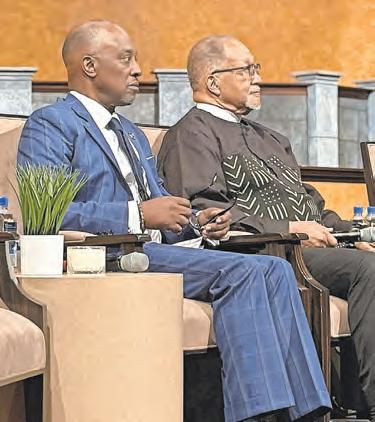
Dr. Ben Chavis, CEO of the National Newspaper Publishers Association (NNPA) (right, sitting next to Ron Busby Sr., president and CEO of the U.S. Black Chambers) was also in attendance Tuesday night and spoke to the crowd about supporting Black-owned media. “Subscribe to a Black newspaper,” Chavis said. Photo by Noah Washington/The Atlanta Voice
next steps for sustained action.
“Subscribe to a Black newspaper- We are bombarded with hopelessness, tonight and tomorrow going forward we should be more conscious about how we help one another.”
Sitting in the audience, Lee Dunn, CEO of Blink Marketing and founder of United 1 GPS, a non-profit dedicated to homelessness, public policy, and restoring the American dream. Dunn has been working closely with Bryant in recent months, emphasizing the importance of action over silence.
“Subscribe to a Black newspaper- We are bombarded with hopelessness, tonight and tomorrow going forward we should be more conscious about how we help one another.”
In response, New Birth joined a grassroots campaign that has since grown into a national movement. Participation in the Target Fast has steadily increased, leading to a significant decline in foot traffic and a reported $12.4 billion drop in Target’s market value, according to BlackPressUSA. A designated Economic Blackout Day on February 28, further emphasized the community’s economic strength.
Also in attendance at Tuesday’s event was Dr. Ben Chavis, CEO of the National Newspaper Publishers Association (NNPA), who addressed the crowd alongside Bryant. The forum provided updates on the boycott’s impact and the
“To me, standing up for DEI is important, as ultimately Black people have a presence in this country — whether it is valued or not,” Dunn said. “We need to leverage our power.”
Participation in the boycott, referred to as the “Target Fast,” has grown steadily with Target’s stock price subsequently falling, leading to significant financial losses. The boycott has even led to events such as “Economic Blackout Day”
Among the brands affected by Target’s DEI rollback is Black Men Smile, an apparel line founded by Carlton Mackey. After being removed from Target shelves, Mackey aligned


with the boycott and launched the brand’s first independent Black History Month collection. The collection, titled “We All We Got,” has since seen a surge in community support following a spotlight moment at New Birth in February.
With over 200,000 supporters and continued pressure from Black churches, entrepreneurs, and community leaders, the boycott has
contributed to a reported $12.4 billion loss in market value and a 7.9% decline in year-overyear store traffic. With efforts like the Bullseye Black Market helping to reroute dollars directly into the Black community, Bryant’s message resonates louder than ever: economic empowerment, not just literacy, is the path forward— and the price of inaction will be paid in full.
By ISAIAH SINGLETON
The Metropolitan Rapid Transit Authority (MARTA) announced they have completed Parking Payment System upgrades at nine MARTA stations.
In April 2025, MARTA finished upgrading the equipment at paid long-term parking facilities at nine heavy rail stations: College Park, Doraville, Dunwoody, Kensington, Lenox, Lindbergh, Medical Center, North Springs, and Sandy Springs. This is part of MARTA’s ongoing commitment to enhance the customer experience across its transit network.
Key Improvements:
New Entry and Exit Gates: Modern gates have been installed to facilitate smoother vehicle flow into and out of our parking facilities
Ticket Dispensers and Payment Machines: Upgraded machines provide a more user-friendly and efficient payment process, allowing customers to conveniently pay on foot at the station
License-Plate Recognition Cameras: Enhanced security measures ensure a safer environment for our customers
Parking rates will remain the same. Customers will also now receive a ticket upon entering the deck and they should take the ticket with them after parking. Customers can pay their fees on foot before exiting by cash or credit/debit card at new kiosks located near the station entrances.
In the future, this system will be compatible with MARTA’s Automated Fare Collection 2.0 system, which means customers will be able to pay for parking and fares through a single MARTA app on their mobile device(s).


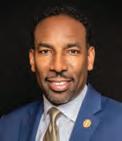












By LIZ COURQUET-LESAULNIER
Mark your calendar for May 5 — or maybe circle it in red.
That’s when the Department of Education will start collection proceedings on the more than five million people who’ve defaulted on their federal student loans. That means financial pain — wage garnishment, seized tax refunds, offset social security checks, and wrecked credit scores — is in the future for people who haven’t made a payment in the past 270 days.
Black folks, who hold a disproportionate amount of student loan debt and are more likely to default — and the Black community as a whole — will pay the highest price.
“The most important thing to know is that this decision is a political choice that prioritizes punishment over solutions,” says Augustus Mays, vice president of Partnerships and Engagement at EdTrust. He points to rising college costs, predatory lending practices, and racism in the labor market as root causes of the student debt crisis.
Yet the Trump administration doesn’t address any of those factors in its decision to play hardball with people who went into debt to get a college education. Instead, student borrowers already struggling to make ends meet are being blamed for their circumstances and penalized accordingly.
The Debt Collective, a union of borrowers fighting for cancellation, agrees.
“Any policy that collects on student debt — rather than pausing collections or canceling the debt outright — will bode poorly for Black borrowers, who disproportionately hold student debt,” says spokesperson Braxton Brewington.
Rooted in the Racial Wealth Gap
A 2024 Pew Charitable Trusts survey of Americans with student loan debt found that 50% of Black borrowers have defaulted on their student loans, while 29% of white borrowers had done so. The high default rate, experts say, is rooted in the racial wealth gap.
“Black borrowers, and Black women in particular, have been stripped of generational wealth,” Brewington says. “Black folks are underpaid in the workplace and then are forced to borrow more to attend college.”
According to the most recent analysis by the Education Data Initiative, Black college graduates carry an average of nearly $53,000 in student loan debt — about $25,000 more on average than their white counterparts — and pay an average of $386 per month. Their white peers pay $349, but data shows white college graduates have seven times the amount of wealth of Black college graduates.
Black women, the most educated demographic in the U.S., are also the most indebted.

They leave school with roughly $41,500 in loans for their bachelor’s degree and more than $58,000 for a graduate diploma — all while earning less than their peers in a job market steeped in racism and sexism.
“Systemic inequities in income, employment, and wealth accumulation already place [Black women] at a financial disadvantage,” Mays says, adding that Trump’s strong-arm collection tactics will make matters worse. “Garnishing wages further destabilizes their ability to meet basic needs, build wealth, and achieve economic security.”
Overall, Americans hold $1.77 trillion in federal student loan debt. The Biden administration managed to cancel $183.6 billion of that for 5 million Americans. President Joe Biden also tried to keep a campaign promise to cancel up to $20,000 in student debt per borrower, but the Supreme Court slapped down that plan.
The Trump administration, however, has no interest in letting people walk away from that debt: “There will not be any mass loan forgiveness,” according to a DOE statement.
Biden’s SAVE plan — his second shot at
student debt relief — would’ve lowered payments based on income, but an appellate court blocked that one, too, in February. The current push to collect, says Brewington, reinstates “a policy of punishment through a Department of Education that clearly isn’t shut down when it comes to operating as a predatory bank.”
Folks having less spending money in their pockets will ultimately hurt the economy, Brewington says. Along with undermining economic mobility and intergenerational wealth, the Trump administration’s tactics will also likely discourage future generations of Black students from enrolling in college at all.
“The fear of being trapped in [student] debt with no way out, especially if default can lead to wage garnishment, will likely deter some students,” Mays says. For Black folks already struggling with debt, he said, the financial strain of wage garnishment “can make it harder to return to school to complete their education or pursue graduate degrees.”
Then there’s the stress, anxiety, and psychological strain of owing more in student loans
than a year’s salary. “Student debt doesn’t just burden your wallet, it takes a toll on your mental health and stress as well,” Brewington says.
Given the administration’s gutting of the Consumer Financial Protection Bureau, the dismantling of the Department of Education, and day-to-day tumult of Trump 2.0, Brewington worries the collections “will be chaotic for student loan borrowers.” Along with repayment options “disappearing and reappearing,” he points out that there’s no one holding loan servicers accountable.
But both Brewington and Mays agree that the answer is to challenge what’s happening.
“The best thing borrowers can do is get organized,” Brewington says. The Debt Collective encourages borrowers to organize and demand mass cancellation, better regulation of loan servicers, and a long-overdue restructuring of the system itself.
Mays at EdTrust calls on borrowers to contact their elected officials at the state and federal level, “and demand an immediate halt to these collections and real action on student debt relief, including targeted relief for Black borrowers.”
By DENNIS MALCOLM ByRON AKA ALE SHARPTON
Hyundai has consistently been impressive with their latest additions to the family, and the 2025 Tucson Hybrid Limited AWD is no different. A plug-in hybrid SUV, this year’s model has upgrades in technology, efficiency, and numerous safety applications to name a few, while the “Limited” trim doesn’t hold back on luxury enhancements while still selling for under $44K fully equipped.
In the looks department, the “Ultimate Red” exterior color gives the Tucson a sporty look on the road, complemented by a muscular frame, 19-inch alloy wheels, standard dark chrome accent grille, LED headlights, a rear spoiler, and a panoramic sunroof to heighten the cool factor. Roof side rails add practicality ideally for adventure seekers, while the sleek LED daytime running lights say it’s all about the future.
Powered by a 1.6-liter turbocharged hybrid engine and six-speed automatic transmission, the Tucson Hybrid comes with a nice kick topping at 268 horsepower and 271 lb.-ft. of torque, paired with the HTRAC All-Wheel Drive (Traction Control System) and four driving modes—Normal, Sport, My Drive,

Hyundai continues to lead the segment in the safety department, equipping this Tucson with lane keeping assist, blind-spot collision warning, forward collision-avoidance assist, and parking collision-avoidance assist. Additionally, the impressive remote smart parking assist allows effortless parking in tight spots; drivers have the option to get out of the car and let it do the work with the press of a button. I recommend going to the website for the full list of safety features; there is a long list, trust me.
Snow. The paddle shifters and shift-by-wire transmission further enhance the driving experience. The gas mileage is forgiving as well, averaging 35 miles per gallon and an all-electric range of 32 miles.
Getting behind the wheel, I appreciated the black-on-black interior with leather-trimmed seats. Comfort takes center stage with heated and ventilated front seats, heated rear seats, and a leather-wrapped, heated steering wheel. Dual automatic climate control with rear air vents brings a pampering cabin experience for all passengers, while the ambient interior lighting sets the mood. This cushy cabin fits
five comfortably, plus ample cargo space. On the tech side, the Hybrid Limited comes loaded. The surround view monitor enhances visibility from all angles, combined with the 12.3-inch navigation system, a WiFi hotspot, premium Bose audio system, Apple CarPlay/ Android Auto connectivity, wireless phone charging are applauded perks. For more customization from the automaker, Hyundai’s Digital Key via your mobile phone and BlueLink+ are two connected services providing remote vehicle management, including climate control, starting the car, and overall heightened security.
Overall, the 2025 Hyundai Tucson Hybrid Limited AWD is a well-rounded SUV that shines in the performance, safety, tech, and value department. Whether you’re looking for an efficient whip to take on virtually any terrain or a tech-filled family vehicle, the Tucson Hybrid Limited holds it down. Oh, and still leading the country when it comes to easing the mind—the famous 10-Year/100,000-Mile Powertrain Limited Warranty and complimentary maintenance coming standard from Hyundai—this SUV should be a strong consideration.
Fuel Economy: 35 city/35 highway/ 35 combined.
Price: Starting at $41,265 MSRP, and $43,470 fully equipped as reviewed.
For more information, visit Hyundaiusa.com

“The
is a story
By DONNELL SUGGS
“The Quincy Avery Effect”, a documentary about the life and career of the quarterback guru of the same name will debut on Hulu on Wednesday, April 23. Avery, a Morehouse College alumnus, former member of the football program, and founder of QB Takeover, spoke with The Atlanta Voice about the film on Monday morning.
The Atlanta Voice: Good morning, Quincy, how’s your day going so far?
Quincy Avery: Good morning.
AV: What do you hope the viewing public takes away from watching “The Quincy Avery Effect”?
QA: I really hope that the public takes away the understanding of resilience and perseverance. The understanding of truly being dedicated to a goal in mind and making sure that your actions and your words are congruent. If you say that you want something you have to be willing to do whatever it takes to get those things.
AV: That sounds like it’s something you strongly believe in.
QA: It’s really what I live by and I truly hope that every single person realizes that they have the opportunity to set their own path.
AV: How did attending Morehouse College prepare you for becoming a successful coach and a business owner?
QA: I think Morehouse played a major impact. I think you start to learn some of those resiliency things at Morehouse College. Things aren’t always the way they are exactly supposed to be. Your financial aid might not be there, your classes might get dropped, my financial aid check might hit late. All of those things are things I experienced at Morehouse College. It really started to let me know that in any situation you’re going to be alright and you’re going to be able to figure things out on the back side of that.”
AV: Without giving anything away about the documentary, what do you believe your journey to professional success might teach someone about perseverance?
QA: In my professional journey I really learned the value of chopping wood. Now, today, people think that things just happen instantly. They see somebody on social media or in the public eye who has reached a level of success and they think it happened overnight.
AV: It’s not as easy as it looks, huh?
QA: There were a bunch of one-view videos. I definitely had to be diligent in my work to see
I really hope that the public takes away the understanding of resilience and perseverance. The understanding of truly being dedicated to a goal in mind and making sure that your actions and your words are congruent. If you say that you want something you have to be willing to do whatever it takes to get those things.
Quincy Avery
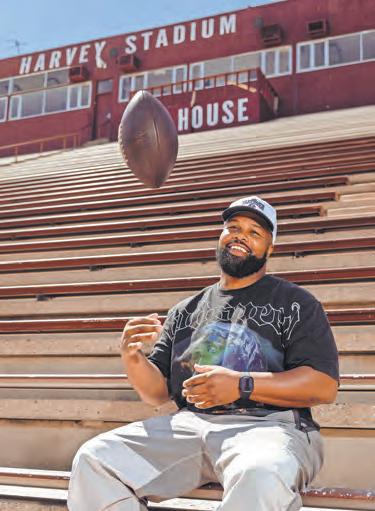
and instructional.
success. I went years without anybody responding to a message. That’s difficult. It’s so difficult to look yourself in the eye everyday and really believe you’re doing the right thing when nothing is shaking how you expected it to shake.
“I’m not the most talented person or the most gifted, or else I’d be playing in the NFL. What I am willing to do is outwork everybody.
This isn’t how I envisioned it. I never thought I’d be where I am today, training this many NFL quarterbacks.
AV: Do you believe the parts of the film that discuss your relationship with your father are just as important as the football piece of the film? As a father to a 10-year-old son, I thought those parts were both inspirational
QA: Everybody can have a unique story with their parents and mine is probably more unique than most. The things I had to go through with my father as a son, learning how to forgive, learning how to still be a good son. A lot of times it’s more difficult than people think.
AV: Are you planning to watch “The Quincy Avery Effect” on Wednesday, release day?
QA: We’re going to do a premiere in Atlanta. A few people in the football industry, a lot of friends and family are going to come out. I’m really excited that I get the opportunity to do that.
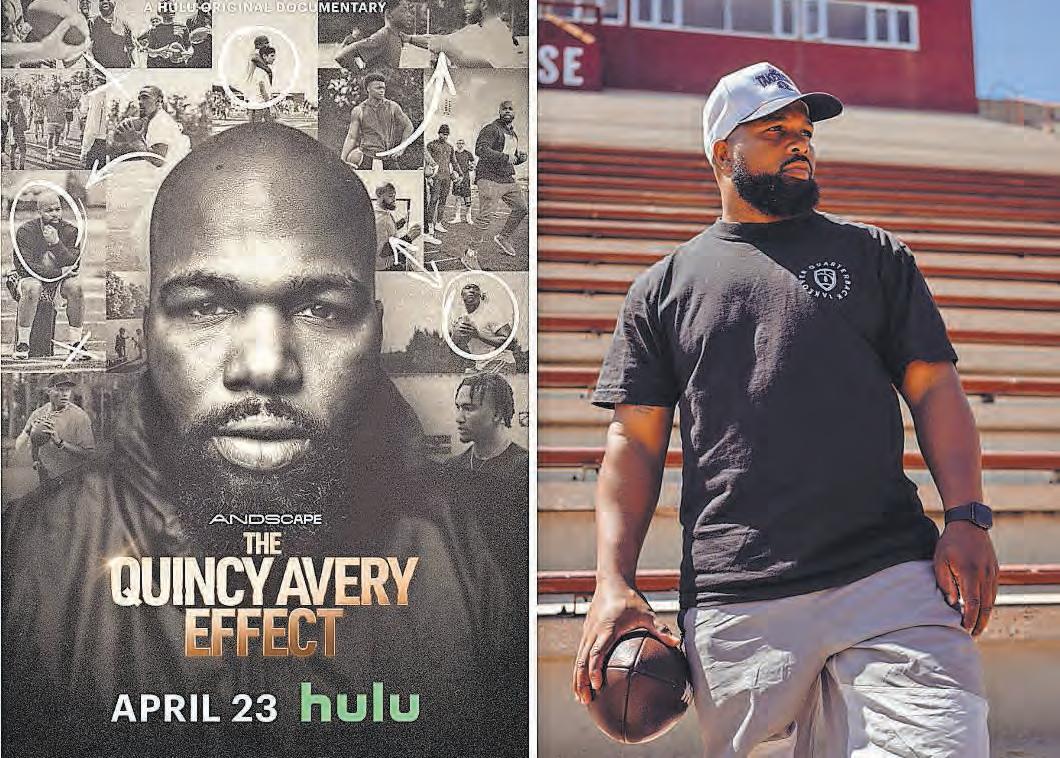

By DONNELL SUGGS
Marietta, GA - One moment during training on Tuesday stands out. Atlanta United manager Ronny Deila got the team together in the middle of one of the practice pitches. It was hard to hear what he was saying, but it might have worked.
“I think we can do things better,” said striker Jamal Thiare after training. “We need everybody. We have to stay positive and keep going.” And it looks like everybody will be available for Saturday in Orlando with wins being few and far between this season for Atlanta United. The last time the Five Stripes picked up three points from a match was almost a month ago during a 4-3 come-from-behind victory over New York City FC. That was on Saturday, March 29. However, the month of April has brought nothing but spring showers their way. Beginning with a 1-1 draw at home against FC Dallas, followed by a 0-1 loss to New England at home, and most recently a 3-0 loss at Philadelphia Union last Saturday.
Heading into another road match at rival Orlando City FC, the Five Stripes are far from playing their best soccer at the moment. This year’s team is off to the worst nine-game start in franchise history.
The good: There are 25 more matches


Against Philadelphia on Saturday, both Latte Lath and Almiron took several shots at the opposing goal without success.
remaining on the regular season schedule.
The bad: Atlanta United is 12th in the Eastern Conference standings with nine points in nine games.
Atlanta United striker Emmanuel Latte, who has scored five goals this season, has not scored in either of the past three matches. He earned a penalty kick during the draw with Dallas and allowed Miguel Almiron to take the kick, which led to him scoring his second goal of the season.
At training on Tuesday, Atlanta players went through their normal paces with the occasional moments of frustration and brilliance. The feeling is that they all know winning will cure a lot of ills, but you have to win first.
“I think we need to convert our chances and we have to score more goals,” said midfielder Mateusz Klich after training on Tuesday. “In general, we have to be better. It’s not good enough.”
Orlando City has also had problems scoring goals this season. The Lions haven’t scored in their past three matches against the
Philadelphia Union, New York Red Bulls, and CF Montreal. Atlanta has played all three of those teams this season and only defeated CF Montreal (3-2 in the home opener) in the process.
“Football is pretty simple, we have to score goals and we don’t,” Klich said. “There are things on the pitch that no one can influence except us.”
What’s Next: Atlanta United will play seven matches during the month of May, so there could very well be a much different conversation taking place a month from now.
Veteran defender Derrick Williams, who missed the match against Philadelphia, was seen lightly jogging with a team trainer during training on Tuesday morning.
SENIOR (62+)

Spacious 1-Bedroom Affordable! Rent Based on Annual Income Amenities, Great Location, and Convenient to Marta Please call for detailed information (404) 586-9098

Piedmont Heart Institute Physicians, Inc. has opening in Canton, GA/ East Ellijay, GA/ Jasper, GA for Non-Invasive Cardiologist. Provide comprehensive cardiology care for children, adolescents & adults. MD/DO or equiv. + 36-mnth. residency internal med./rltd. + 36-mnth fellowship cardiovascular disease/rltd + GA medical license/eligible. Send resumes to Piedmont Heart Institute Physicians, Inc., Attn: Lacey Smith, 2001 Peachtree Rd. NE, Ste. 435, Atlanta, GA 30309. Must ref job title & code: NIC-GC.
Medical Physicist (Remote, OR): Prov med phy&hlth phy conslt svc 2CL HC fac. Nur perf of DIAG RAD mach is up2 std. Nsur RAD envirn whr RAD prod mach&radioistop r usd is sf. Nsur cp w/ST&fed regs. Calc& msur radiolog qty 2intrprt&impl regs. Cond PhyTst of DIAG mach. Cond srvys w/vari RAD dtctrs& srvy-mtrs & rcrdkeep. Posn rprt 2Atlanta,GA but can tlcmt frm resi in OR as freq trvl up2 4dy/wk 2 unant CL loc in OR req. Ltd 10% ovrnt dom trvl 2unant CL loc in US req. MS in Phys/Hlth Phy/ RAD Sci/rltdfld/frgn equiv. Email CV2 West Physics @ sandy.boerstler@westphysics.com

Sealed Bids for 25RFP1349711A-BKJ Qualified Block Grantee – Opioid Abatement Settlement for the Department of Behavioral Health & Development Disabilites will be accepted by through the WebGrants System at https://www.bidnetdirect.com/georgia/fultoncounty on due on Wednesday, April 29, 2025 at 11:00 A.M.. Proposal(s) will be publicly viewed online via BidNet Direct only the names of the proposers will be disclosed at the opening.
Bid Bond: N/A
Scope of Work: Fulton County, Georgia (“County”) is seeking proposals for a Qualified Block Grantee (QBG) under the agreement with Georgia’s Opioid Abatement Settlement funds. The governance structure for the Opioid Settlement Program includes the Trustee, the Georgia Opioid Settlement Advisory Commission (GOSAC), the Qualifying Block Grantees (QBGs), and the Regional Advisory Councils (RACS). This structure facilitates the distribution and oversight of the State Opioid Funds, ensuring that the funds are used effectively to combat the opioid crisis at both the local levels.
The detailed scope of work and technical specifications are outlined in the Scope of Work, Section 3 of this proposal document.
General instructions, specifications and/or plans for this project can be downloaded Free of charge at https://www.bidnetdirect.com/Georgia/fultoncounty under “Bid Opportunities”.
Fee: N/A
Contract Term: 1 Year
If you have any questions regarding this project please contact Brian Jones, CAPA (404) 612-6306 or Email: brian.jones@fultoncountyga.gov.
Fulton County reserves the right to accept or reject any or all bids and to waive technicalities.
Sealed Bids for 25RFP132715A-BKJ Co-Responder Program – PlatForm for the Department of Behavioral Health & Development Disabilites will be accepted by through the WebGrants System at https://www.bidnetdirect.com/georgia/fultoncounty on due on Wednesday, April 30, 2025 at 11:00 A.M.. Proposal(s) will be publicly viewed online via BidNet Direct only the names of the proposers will be disclosed at the opening.
Bid Bond: N/A
Scope of Work: Fulton County, Georgia (“County”) in partnership with the Fulton County Sheriff’s Office (FCSO), proposes the Co-Responder Program (CoRe) to serve adults in Fulton County, Georgia experiencing behavioral health crises, with a focus on individuals experiencing overdose due to Substance Use Disorder (SUD) and Co-Occurring Disorders (COD), by providing training and resources to assist first responders with the administration of FDA-approved opioid overdose reversal medications, crisis de-escalation, and warm handoffs of clients to community-based resources that provide timely and effective, culturally competent treatment and wraparound supports.
The detailed scope of work and technical specifications are outlined in the Scope of Work, Section 3 of this proposal document.
General instructions, specifications and/or plans for this project can be downloaded Free of charge at https://www.bidnetdirect.com/Georgia/fultoncounty under “Bid Opportunities”.
Fee: N/A
Contract Term: 1 Year, 3 Renewal Options.
If you have any questions regarding this project please contact Brian Jones, CAPA (404) 612-6306 or Email: brian.jones@fultoncountyga.gov.
Fulton County reserves the right to accept or reject any or all bids and to waive technicalities.
PRODUCT MANAGER, TECHNICAL PLATFORM- API
Product Manager, Technical PlatformAPI (multiple positions), US Bank, Atlanta, GA to be respsbl for prod mgmt in an Agile envrmnt within ICS (Integrated Card Sys) API journey to analyze credit card API as a prod. Pos reqs a Bachelor’s deg in CS, Computer or Elctrncs Engg, Info. Tech., or a rltd field, followed by 5 yrs of progressively respsbl exp in an Info. Tech. Proj Mgr, or rltd, occupation. Must incl 5 yrs of exp w/ each of the following: (1) Agile; (2) Code Mainframe app programs using COBOL; (3) Mainframe Z/OS, COBOL, JCL, & IBM Db2; &, (4) Credit Card Disputes Lifecycle & Credit Card Transaction Lifecycle. Teams may work from home & the office. Pay Range: $130,250.00 - $164,100.00. Apply online https://careers.usbank.com/global/en or email recruiting.excellence@usbank.com, incl job req 2025-0005892 in subject line.
Lead Backend Microservice Applications Engineer (mltpl pos’s), US Bank, Atlanta, GA to Dsgn, dvlp, test, & maintain backend microservice apps dvlpd as Spring Boot based RESTful web svcs & GraphQL APIs written in Java. Pos reqs a Bachelor’s deg in CS, Computer or Elctrncs Engg, IT, or rltd field, & 5 yrs of progressively respsbl exp in a S/w Dvlpr, or rltd, occupation. Must incl 5 yrs of exp w/ each of the following: 1. Write & dvlp unit & integration tstng s/w. 2. Diagnose, isolate, & debug s/w prblms, incl prblm res. 3. Java, J2EE, Junit, Spring Batch, Spring MVC, Spring Boot, Mockito, IntelliJ, Eclipse, Maven, & Jenkins. 4. Github, Gradle, & SOAP. 5. Drone, Docker, & Kubernetes. Teams may work from home & the office. Pay Range: $149,760$186,500. Apply online https://careers. usbank.com/global/en or email recruiting.excellence@usbank.com, incl job req 2025-0005894 in subject line.